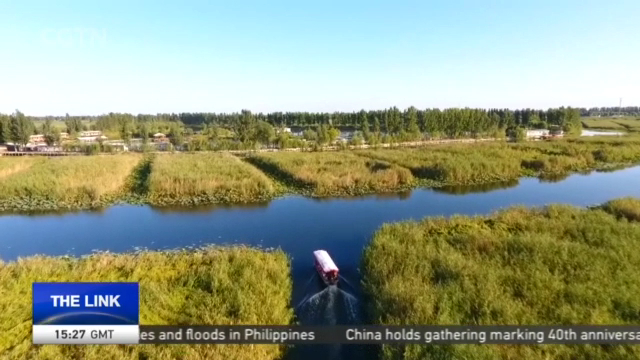
09:17, 03-Jan-2019
Wetlands Restoration: Baiyangdian Lake is vital to Xiong'an New Area's success
Updated
09:01, 06-Jan-2019
03:02

One beneficiary of the government's ecological efforts in Xiong'an is the Baiyangdian Lake. The complex of freshwater wetlands is northern China's largest, but has suffered pollution and over-exploitation for decades. Now, authorities and environmental experts are sparing no effort to make the lake clean again. CGTN's Ning Hong has more.
Before the restoration efforts start, Xiao Guohua and his team are trying to find out how bad the water quality is.
XIAO GUOHUA, DIRECTOR HEBEI OCEAN AND FISHERY SCIENCE RESEARCH INSTITUTE "We are collecting water and mud samples in Baiyangdian Lake. The survey aims to provide basic data and the scientific basis for an ecological restoration."
The survey is part of a project led by the Chinese Academy of Fishery Sciences. The overgrowth of reeds and the local aquaculture industry are causing a serious case of eutrophication, a word scientists use to describe the growth of excessive algae and plant life in a body of water. This can have a negative effect on animal life and Xiao believes an ecological solution is the best approach.
XIAO GUOHUA, DIRECTOR HEBEI OCEAN AND FISHERY SCIENCE RESEARCH INSTITUTE "If the ideal reed coverage is 70 percent, then we should keep it, not by cutting them down but by using certain kinds of fish to keep the balance of aquatic plants here."
The project may last for at least three years. It is just a beginning.
NING HONG BAIYANGDIAN LAKE "For years the Baiyangdian lake has been suffering from pollution and over exploitation. Now it is a vital part of the Xiong'an new area, and the priority here is to raise the quality of the water in order to restore the ecosystem in the future."
Inside the lab of Hebei University, the water samples are being analyzed. And Professor Kang Ming is testing another approach using a virus to control the expansion of pollution.
PROF. KANG MING COLLEGE OF LIFE SCIENCES, HEBEI UNIVERSITY "We definitely could find some active viruses that may control the over growth of bacteria and algae that is generated by the polluted water."
They have isolated more than 30 strings of algae viruses so far. Some are being tested on fungus from the lake. Hebei University is leading the efforts to develop ecological solutions.
KANG XIANJIANG, PRESIDENT COLLEGE OF LIFE SCIENCES, HEBEI UNIVERSITY "It is a very unique wetland, with much life living inside it. There must be an overall plan, involving sewage treatment, pollution control, recycling, the economy and biological restoration."
The Xiong'an New Area is built around this wetland. The success of the city will be largely dependent on the restoration of the natural beauty here. Ning Hong, CGTN, Hebei province.

SITEMAP
Copyright © 2018 CGTN. Beijing ICP prepared NO.16065310-3
Copyright © 2018 CGTN. Beijing ICP prepared NO.16065310-3